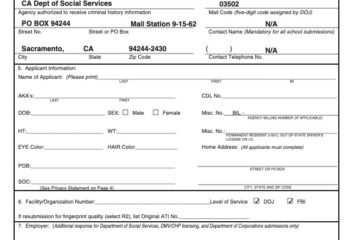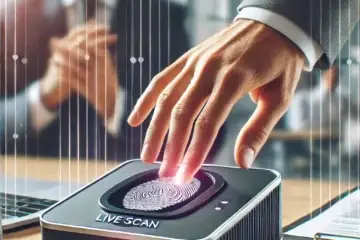Moving to another country requires multiple legal documents, and one of the most important is an FBI background check. Many governments require this document for work visas, residency permits, citizenship applications, and other immigration processes. It serves as proof of an individual’s criminal history or confirms a clean record, ensuring that applicants meet legal requirements before obtaining immigration status. Understanding the application process, authentication steps, and legal requirements is essential for a smooth relocation experience.
What Is an FBI Background Check?
An FBI background check, officially known as an Identity History Summary Check, is a document issued by the Federal Bureau of Investigation that details an individual’s criminal history in the United States. The record is based on fingerprint submissions and includes arrests, charges, and law enforcement reports. If no criminal history exists, the document states that the individual has a clean background. Many foreign governments require this document as part of the immigration process to ensure applicants do not pose security or legal risks.
Why Do You Need an FBI Background Check for International Relocation?
Many countries request an FBI background check before approving long-term visas, permanent residency, or work permits. Employers may also require this document as part of a background screening process. Governments rely on criminal history reports to assess an applicant’s suitability for immigration, employment, or citizenship. Without an authenticated background check, visa applications may be delayed or denied. Common reasons for needing an FBI background check include work visa applications, residency or citizenship requests, adoption screenings, marriage-based immigration, and student or exchange visa programs.
How to Apply for an FBI Background Check for International Relocation
Obtaining an FBI background check requires fingerprint submission, application processing, and document authentication before it is valid for international use. Applicants must first determine the correct submission method. The FBI allows direct applications through its Criminal Justice Information Services (CJIS) Division, where individuals submit fingerprint cards, application forms, and payments via mail or electronically. The processing time for direct FBI submissions ranges from two to four weeks. An alternative option is to use an FBI-approved Channeler, which is a private company authorized to process background checks faster. Channelers electronically submit fingerprint data and typically provide results within 24 to 72 hours. However, some countries only accept background checks obtained directly from the FBI, so it is important to confirm the requirements before applying.
The next step is fingerprinting, as the FBI background check is based on fingerprint records. Applicants must submit fingerprints on an FD-258 fingerprint card, which can be obtained through local law enforcement agencies, private fingerprinting services, or live scan fingerprinting centers. Live scan fingerprinting digitally captures fingerprints and submits them electronically, while traditional ink fingerprinting requires physical submission. Poor fingerprint quality can result in application rejection, so it is best to use a trained professional to ensure accuracy.
After completing fingerprinting, the application must be submitted with the required documentation and processing fee. The FBI accepts payments through credit card, money order, or certified check. If applying through a Channeler, the company will handle electronic submission, expediting the process. Once processed, the FBI background check report is available in electronic and physical formats. The electronic version is delivered via secure email, while the physical copy is mailed through the United States Postal Service. Some foreign governments require a physical copy with an official seal, so applicants should request both formats.
Authenticating the FBI Background Check for International Use
Foreign governments do not accept FBI background checks unless they have been properly authenticated. Depending on the destination country, applicants may need to obtain an apostille or complete an embassy legalization process.
Countries that are members of the Hague Apostille Convention require an apostille issued by the U.S. Department of State. An apostille certifies the authenticity of the document for international use and eliminates the need for further embassy verification. If the country is not part of the Hague Convention, additional legalization steps are required, including authentication by the U.S. Department of State and legalization by the embassy or consulate of the destination country.
To obtain an apostille for an FBI background check, applicants must submit the original background check report to the U.S. Department of State Office of Authentications in Washington, D.C. The request must include a completed Form DS-4194, which serves as the official apostille request form, along with the appropriate processing fee. Standard apostille processing can take two to four weeks, though expedited services are available through third-party providers.
For countries that do not accept apostilles, the FBI background check must be legalized at the destination country’s embassy or consulate. This process involves obtaining authentication from the U.S. Department of State before submitting the document for final legalization at the foreign embassy. Some countries also require certified translations of the background check, which must be completed by a government-approved translator before submission. Each embassy has specific legalization procedures, so it is essential to check their requirements before sending documents.
Common Mistakes to Avoid When Getting an FBI Background Check for Relocation
One of the most common mistakes applicants make is waiting too long to apply for an FBI background check. Since the processing and authentication steps take several weeks, it is crucial to begin the process early to avoid delays in visa processing. Another issue is submitting fingerprints that do not meet FBI quality standards. Blurred or improperly rolled fingerprints can lead to application rejection, requiring resubmission and extending processing time. Using a professional fingerprinting service reduces the risk of errors.
Failing to verify apostille or legalization requirements is another frequent problem. Some applicants assume an apostille is sufficient when their destination country actually requires embassy legalization. Before submitting a background check, it is necessary to confirm the specific authentication steps required by the foreign government. Translation requirements are also commonly overlooked. Some countries require background checks to be translated into their official language before acceptance, which must be done by a certified translator.
Final Steps Before Submitting the Background Check for Visa Processing
Before submitting the FBI background check to the foreign government, applicants must ensure that the document has been properly authenticated through apostille or embassy legalization. Some immigration offices require documents to be issued within a specific time frame, often within three to six months of submission. If a background check is older than the permitted timeframe, the government may request a new report. Keeping certified copies of the background check and authentication documents ensures that there is a backup in case the original is lost or additional verification is needed.
Conclusion
An FBI background check is an essential document for international relocation, required for work, residency, and citizenship applications. The process involves fingerprint submission, background check processing, and authentication through apostille or embassy legalization. Each country has different requirements, so it is critical to confirm the correct steps before applying.
By submitting fingerprints correctly, following the proper authentication process, and ensuring compliance with international legal standards, applicants can prevent unnecessary delays. Starting early, checking country-specific requirements, and keeping certified copies of all documents will ensure a smooth transition when relocating abroad.



0 Comments